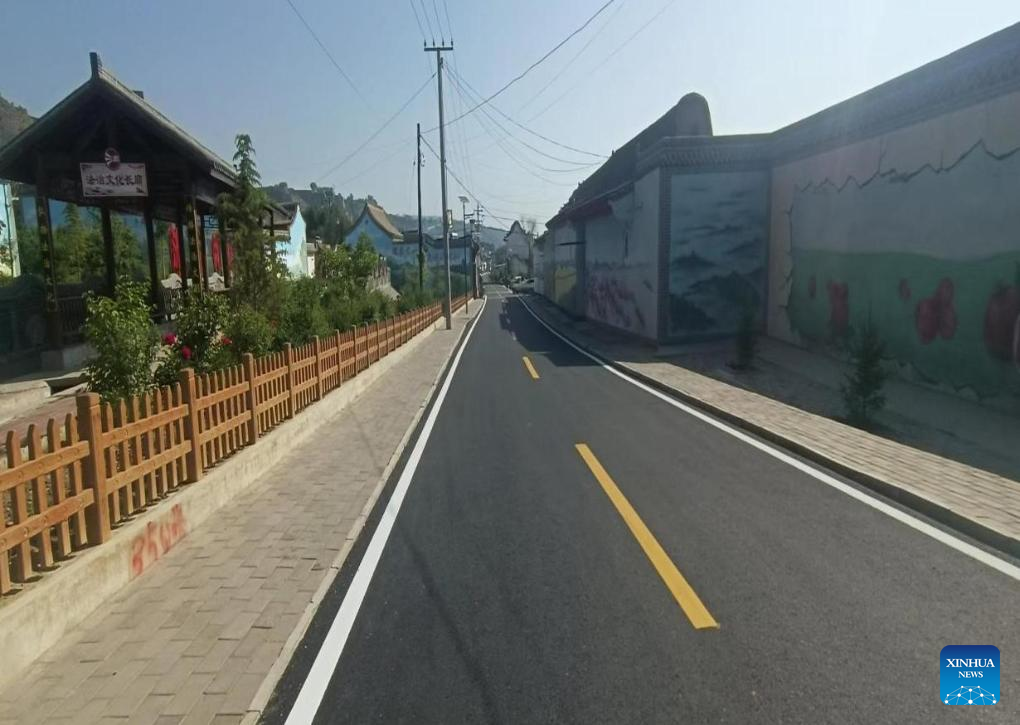
This undated photo shows a road paved with asphalt in Miaojia Village of Xinji Township in Linxia Hui Autonomous Prefecture, northwest China's Gansu Province.(Xinhua)
LANZHOU, Dec. 21 (Xinhua) -- The meeting room in the village committee in northwest China's Gansu Province was packed with township and village cadres and representatives of villagers.
Bai Qingfang stepped into the village committee, ready to discuss the most disputed issues with the attendees and search for solutions together.
"The main road at the end of the village has been damaged. The asphalt needs to be paved quickly, or else it will affect the rural eatery business," said one.
"The old water channel needs to be renovated as its poor irrigation functions will affect the yield of melons," said another.
In recent years, as the agricultural industry in the village has continued to expand, various village-level issues such as the improvement of village appearance and the renewal of infrastructure have emerged, posing a new challenge for the governance of the village committee.
To explore a mechanism for efficiently solving these kinds of issues, in 2020, Miaojia was appointed as a pilot village where a consultative council consisting of political advisors, grassroots cadres, country squires and representatives of villagers was formed. The council members, totaling 24, are all selected by villagers.
"Any proposal would be discussed, investigated and settled by members of the consultative council. The details of the settlement would be disclosed for public supervision," said Bai, Party chief of Miaojia Village in the Hui Autonomous Prefecture of Linxia.
One of the cases the council helped solve was the construction project of a floodwater drainage channel.
The project was put on the agenda in March as a vegetable planting base in the village was frequently drowned by rainfall. This caused damage to the crops of 30 households and resulted in losses for the collective income, said Yuan Guoshun, one of the council members.
However, some farmers disagreed with the project as the new channel would occupy some of their farmland.
Members of the council then persuaded farmers in the base to lease their land to a company. Instead of farming themselves, they could receive dividends from the company, and meanwhile, find jobs elsewhere. Following land leasing, the company was subsequently responsible for the construction of the drainage channel.
"The project that had been delayed for two years was solved within two months. That's the power of collective consultation," said Yuan.
With the council addressing problems, more and more villagers are more willing to participate in village issues.
Villager Ma Mudan suggested pulling up weeds at the roadside in the village, and growing some flowers with long flowering season and low costs.
"My suggestion was soon accepted, and I turned my friends to come to help grow flowers," she said.
Over the past three years, similar consultative council platforms in townships, villages and residential communities have been set up in the prefecture, with more than 2,000 issues of various kinds addressed and solved. Land confiscation and relocation, the renovation of old residential areas and improvement of the living environment are among the related aspects.
"The platforms and mechanisms established to guide the people to participate extensively in community-level social governance have not only built consensus but also pooled wisdom and strength for improving community-level social governance as well as serving social development," said Zhang Zhijun, chairman of the prefecture's political advisory body. ■



